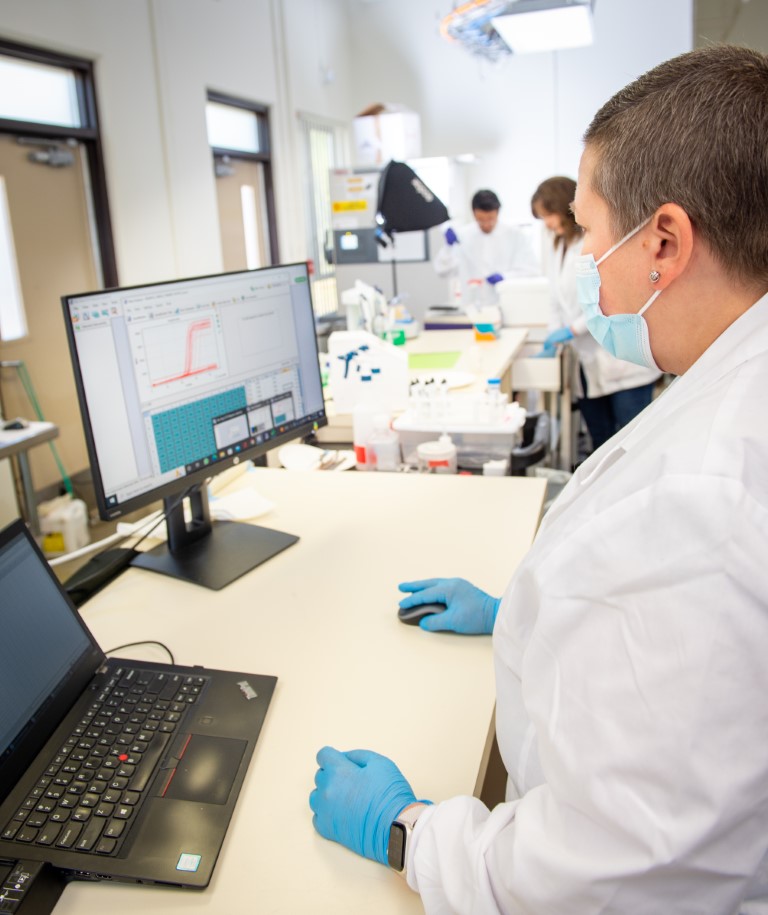PULLMAN, Wash.
September 22, 2022 – Agicultural biotech company Qualterra (formerly named NuPhY) has been awarded a competitive USDA SBIR Innovation Grant to commercialize its sequencing-based virus diagnostic service and help farmers combat destructive viral diseases. Dr. Seanna Hewitt, genomics scientist and grant writing specialist at Qualterra, explains, “In long lived, clonally propagated plants like fruit trees, it’s especially important to determine early if symptoms are caused by a transmissible virus, or by something else that can be treated. It’s essential to have access to testing in order to make timely management decisions.”
For years, Qualterra’s viral screening program has been assisting growers in making these decisions. But last year the program got a boost when Qualterra received a USDA NIFA SBIR Phase I grant to develop a new platform based on high-throughput sequencing (HTS). “We found that our HTS platform provides excellent detection – it’s 100 times more sensitive than RT-qPCR, which is the current industry standard for viruses and viroids,” explains Amy Mraz, VP of Molecular Diagnostic Services at Qualterra. “It also has the added benefit of being a comprehensive screen,” and can detect all viruses present in a plant sample, unlike PCR or RT-qPCR tests which are limited by the sequences they target. In proof-of-concept experiments last year, Qualterra scientists detected up to 13 different viruses in a single sample; and many of these viruses had been missed by previous, targeted screenings.
The successes of the 2021-2022 research program led to the funding of the 2-year SBIR Phase II grant, which will focus on optimizing the platform for turnaround time and cost. “It’s exciting to build on the success of last year’s program,” says Dr. Hewitt. One of the biggest problems facing the HTS-based platform is the turnaround time required for samples to be sequenced. “We have no control over the sequencing center’s timeline,” explains Mraz. Instead, some of the Phase II grant funding will go towards purchasing a HTS sequencer for viral screening. “It will provide the flexibility to choose how to run the projects. For most projects we can test the samples right here, and the rapid turn-around time allows us to quickly provide answers to our customers.”
The work doesn’t end there however, and plenty of optimization remains to be done. The nearly $600,000 grant will support scientists, technicians, and a grad student intern who will all help establish new protocols for the sample preparation, sequencing, and data analysis. A sub award to Dr. Amit Dhingra’s lab at Texas A&M will further support protocol development and sequence analysis. “This is a great opportunity to provide a state-of-the-art technology to the horticultural industry, and pre-emptively mitigate millions of dollars of losses that are incurred each year as a result of viral pathogens” said Dr. Hewitt.
About Qualterra
Qualterra’s platform of technologies have been developed for over a decade and ensure accelerated production for true-to-type plants and tree fruits, increase yields and plant quality based on unique formulations of biochar that can sequester significant amounts of carbon and responsibly eliminate crop waste, and provide robust genetic and disease testing and other analytical services for growers and producers. Qualterra’s lab is listed by the CPCNW as capable of testing for Little Cherry Virus 2 and X-Disease.


